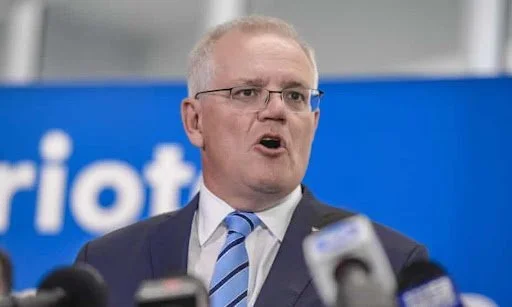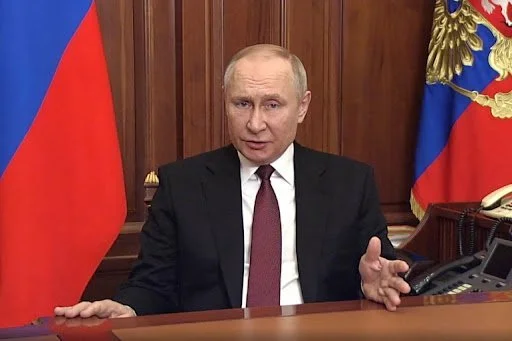Australia Sanctions Russia for Invasion of Ukraine
The Australian Prime Minister gives a statement on sanctions targeting Russia. Photo: Roy Vendervegt/AAP
In lockstep with Western partners, Prime Minister Scott Morrison imposed sanctions on Russia that target multiple aspects of its economy. Alongside the US, EU, NATO, and other allies, Australia sanctioned Russian President Vladimir Putin, financial institutions, lawmakers, oligarchs and 13 Belarussian individuals in response to the ongoing Russian invasion of Ukraine.
Morrison said these sanctions would deter and “ratchet up that pressure on Russia,” but acknowledged that Russian-Australian trade is insignificant, valued at less than $1 billion. Nevertheless, Morrison sought to be a part of the resistance against Russia. In staunch condemnation of the aggressor nation, Morrison said that “those who are financing and profiting from…invading its neighbor should have nowhere to run and nowhere to hide.”
Australia is not a member of NATO, but is part of the Five Eyes partnership, an intelligence alliance between Australia, Canada, New Zealand, the UK and the US, and is supporting NATO and its allies through sanctions and aid to Ukraine.
The sanctions went into effect on Sunday. The Australian Department of Foreign Affairs and Trade (DFAT) is responsible for implementing these sanctions. They cover Russian state-owned businesses and organizations, such as Sberbank and Transneft, an energy company. Sanctions also hit individuals “of economic or strategic significance to Russia” and senior officials within the government.
DFAT will also impose sanctions on the Ukrainian regions of Luhansk and Donetsk, which will take effect on March 28. These sanctions prohibit any trade of restricted goods, services, or assets. There were already sanctions in place on the Crimean Peninsula following Russia’s unilateral annexation of the region in 2014 and the instigation of a separatist civil war in the Donetsk and Luhansk regions.
President Vladimir Putin addresses the nation, initiating the invasion of Ukraine. Photo: Screengrab from Kremlin.RU/AFP
Putin is not safe from the sanctions, either, Foreign Minister Marise Payne said on Saturday. The Australian government is targeting his personal assets and interests in state-owned and oligarch-owned businesses, and has placed a travel ban on Putin and members of Russia’s Security Council. Acknowledging the “exceptional” nature of this decision, Payne reflected that this situation warranted an exceptional response.
Like many other nations, Australia felt little political gridlock in passing the sanctions. The opposition leader Labor MP Anthony Albanese expressed his support for PM Morrison’s proposed sanctions. He reiterated Morrison’s condemnation, calling Russia the sole “aggressor” and the invasion “shameful.” This unity contrasts with the infighting that previously came with national security issues, particularly the Australian relationship with China.
While Australia has little direct exposure to the sanctions, the downwind consequence of the ruble’s “inevitable” collapse will have a significant, if ambiguous, effect on the Australian economy. Australian Treasurer Josh Frydenberg said that while exporters would benefit from higher LNG and food prices, Australian consumers would likely see a negative impact.
Australia has also promised to provide Ukraine with lethal military equipment and has pledged $4 million in military assistance to NATO’s Trust Fund for Ukraine. Neighboring New Zealand also announced a ban on exports to the Russian military and a travel ban for Russian officials.


